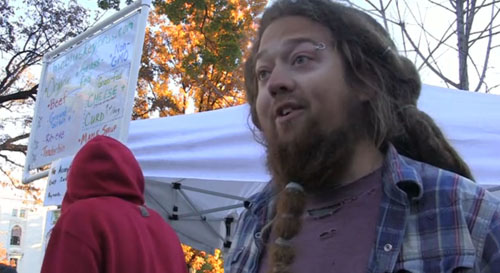by Timothy Weisberg
Pavement Pieces staff
MADISON, Wis.–In the midst of a presidential election that has focused on the middle class, the state of the economy, jobs and unemployment, there is one sector of the American population that appears to have fallen on deaf ears: farmers.
The backbone of the American economy is finding it increasingly difficult to find any political clout this election as the Romney and Obama campaigns focus their attention on a downtrodden economy and restoring the middle class.
The Family Farm
In the state of Wisconsin, agriculture is the root of the economic landscape. According to the Wisconsin Farm Bureau, a grass-roots organization that focuses on farm policy reform, 98 percent of the farms in the state are family owned and operated. And with one of the worst droughts to hit the upper Midwest in nearly 25 years, Congressional inaction on important farm policy legislation like the Farm Bill leave many young farmers in “America’s Dairyland” struggling to find a political identity.
“I hardly hear anything about family farms from either candidate,” dairy farmer Brady McClusky said from his booth at the Dane County Farmers’ Market in Madison, Wis. “I’d like to see our candidates focus more on the food-growing sector of America.”
McCluskey, 30, is a fourth-generation dairy farmer for McCluskey Brothers his family’s organic dairy farm in Hill Point, Wis. that specializes in the production of milk, cheese, maple syrup, and grass-fed beef.
The Dane County Farmers’ Market is the largest producer-only market in the country, where over 150 vendors sell goods every Saturday morning in downtown Madison and on a good day, average 20,000 customers, according to market manager Larry Johnson.
Dane County Farmers’ Market: Madison, Wis. from Pavement Pieces on Vimeo.
But as Congress stalled on the passing of a new Farm Bill –the bill does everything from setting subsidies for crop insurance to providing nutrition programs for low-income households–that expired Sept. 30, payments to milk producers like McCluskey Brothers also expired.
Known as the Milk Income Lost Contract Program it is designed to help local dairy operations by compensating dairy farmers when milk prices fall below a certain level, according to the United States Department of Agriculture website .
“We definitely need some sort of safety net for farmers out there,” McCluskey said. “We haven’t had a drought like this since ‘88 as far as I can remember. It affected us pretty hard.”
However, according to Casey Langan, Executive Director for Public Relations at the Wisconsin Farm Bureau, one of the main reasons agriculture may not be on the top of the candidates’ political agendas is because it is the one sector that has not been drastically affected by the economic recession.
“Agriculture has been a bright spot in an otherwise dismal economy,” he said in a phone interview.
Food Sector Economic Growth
In fact, a 2011 survey by the Dane County Farmers’ Market revealed that over the course of 29 Saturday farmers’ markets, customers spent about eight million dollars, according to market manager Larry Johnson.
A 2011 study by Steven C. Deller, professor of Agricultural and Applied Economics at the University of Wisconsin-Madison, on the economic impact of agriculture at the county level found “relative stability in overall employment” in agriculture from 2006-11. The study also found that the Wisconsin agricultural industry generates more than $59 billion in economic activity and provides 353,991 jobs.
“If there’s a silver lining about the hit that agriculture took this year with the drought is that agriculture was in a little bit better position to handle this drought and to handle the downturn in the economy than it was in the 1980s,” said Langan. “Farmers are not quite so leveraged as they were in the (80s) when they were borrowing a lot of money for new land and land values were inflated.”
But the biggest concern for young farmers like McCluskey is the rising costs of living, which make it nearly impossible for young farmers to forge their way into the industry.
“Young people like us don’t have the money to go out and buy 100 acres and farm equipment,” he said. “It usually needs to be passed down (from generation to generation).”
Yet finding a political leaning might change this election for young farmers like McCluskey who remain undecided and uncertain about the future and sustainability of the food sector.
Estate Tax
The estate tax –a tax on your right to transfer property over when a spouse dies–is a divisive issue for each candidate. Currently, estates worth up to $5.12 million are exempt, while estates worth more are taxed at 35 percent. While Romney calls for the permanent repeal of the estate tax, Obama’s tax plan calls for the lowering of asset tax exemption and increasing the tax from 35 to 45 percent.
“If we can’t get that fixed, that will start to be more of an issue that prohibits younger people from taking over the farm,” Landan said. “It makes estate planning all that more complicated for that farmer who does want to see the farm in tact and passed onto the next generation.”
